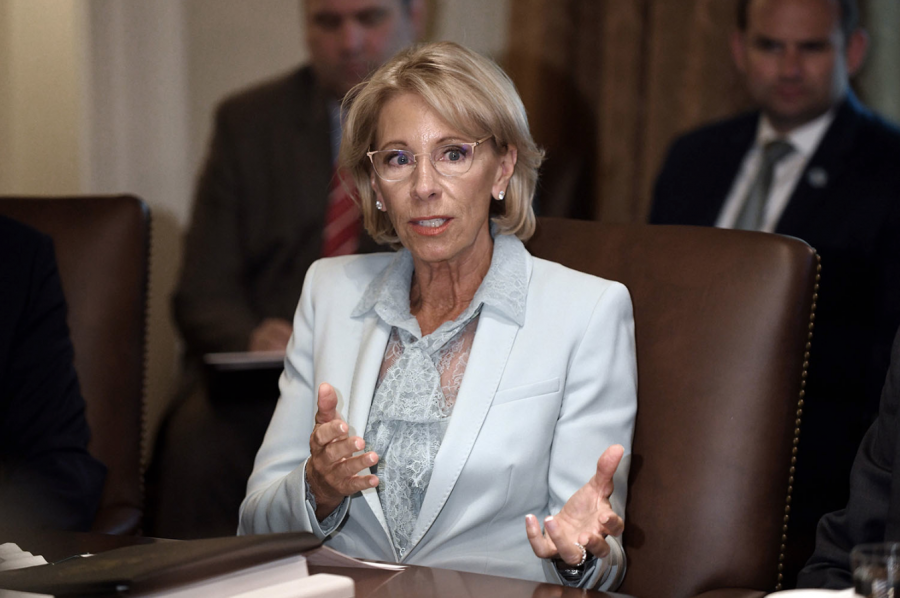UI officials address federal proposal to change sexual-assault guidelines
The UI will not make any immediate decisions in response to the Education Secretary’s proposed changes to sexual-assault guidelines.
Secretary of Education Betsy DeVos speaks during a Cabinet meeting in the Cabinet Room of the White House on Wednesday, July 18, 2018 in Washington, D.C.
November 28, 2018
The University of Iowa is waiting to determine whether any policy changes will need to be made following Education Secretary Betsy DeVos’ recently proposed changes to Title IX guidelines on sexual misconduct, which would bolster the rights of students accused of sexual assault.
Although the definition of sexual assault and how it is reported would be changed by DeVos’ proposal, whether these suggestions are implemented will be up to the universities.
“The University of Iowa will follow its current policies until it has conducted a thorough review of the … proposed Title IX regulations on sexual misconduct for higher-education institutions,” said Monique DiCarlo, the UI Title IX and sexual misconduct response coordinator, in a statement.
The university will determine whether policy changes need to be implemented once the regulations are completed after a 60-day public-comment period, she said.
“The university takes all reports of sexual assault seriously, and there is absolutely no place for sexual misconduct and violence on campus,” DiCarlo said. “We will continue to respond to all reports of sexual misconduct by offering and providing support and resources to those who need it.”
There are UI teams committed to prevention of sexual assault, support of survivors, and accountability of offenders, she noted.
The accountability in particular is placed in a gray area by the new proposal, because DeVos’ changes would allow the accused perpetrator of sexual misconduct at a higher-education institution to question the victim through a third party, which opponents of the proposal have said would be traumatizing for the survivor.
“The cross-examination piece is going to have a huge impact, because it protects the accused but not in an equitable environment,” Domestic Violence Intervention Program Executive Director Kristie Doser said. “To create an environment where there’s not equity is inappropriate.”
Overall, Doser said, DeVos’ proposal undermines the intention of Title IX, which was implemented as a protective measure for sexual-assault victims to feel safe coming forward at an educational institution.
“The language that defines sexual assault in these changes is going to shut down victims,” Doser said. “I think there are so many myths about sexual violence, and all this does is add one more nail to the coffin.”
RELATED: UI officials working to mitigate annual uptick in sexual misconduct
Victims often don’t speak up because they don’t know if their experiences qualify as an act of sexual violence, she said, and the guidelines DeVos proposes would negate the progress that institutions have made in encouraging victims to come forward.
Another controversial aspect of the DeVos plan relates to the way it overrides the Obama-era Dear Colleague letter from 2011, which extended the preponderance of evidence standard to encompass sexual-assault cases in an effort to make the proceedings of sexual-misconduct cases more efficient.
The intention of changing this standard was to make it easier for victims to step forward should they wish to have their case investigated, and the concern is that DeVos’ proposed guidelines would place the burden of proving an incident of sexual assault on the victim.
“What we see in the proposed guidelines is that institutions will be allowed to go to a two-tiered system of a higher standard for one kind of misconduct than another,” Women’s Resource and Action Center Director Linda Kroon said. “The concern around that is that it’ll make it harder to hold anyone accountable for that kind of misconduct.”
In addition, Kroon said, more litigation in regard to sexual misconduct leads to a culture of permissiveness, the very kind her organization and others similar to it are trying to change.
“We’re trying to move toward healthier norms of interaction,” Kroon said. “This just feels like, to me, a worrisome development with the potential to do real harm.”






